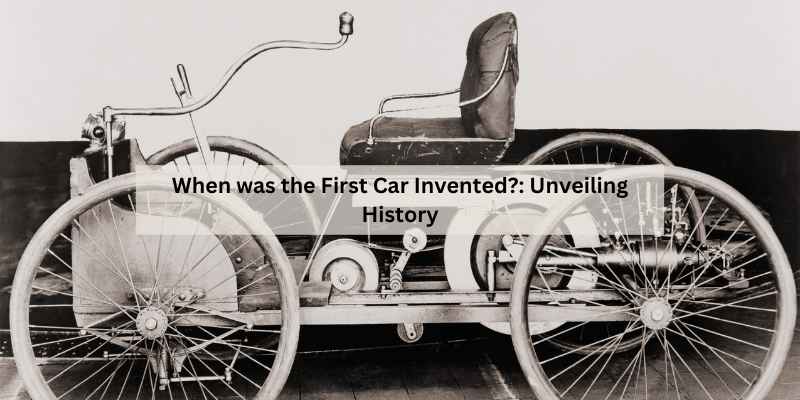When was the First Car Invented?: Unveiling History
The first car was invented in 1885 by Karl Benz. This vehicle, known as the Benz Patent-Motorwagen, marked a significant milestone in automotive history.
The invention of the car transformed society, changing how people travel and connect. Before the automobile, transportation relied heavily on horses and carriages. Karl Benz’s creation revolutionized personal mobility, paving the way for modern vehicles. The Patent-Motorwagen utilized an internal combustion engine, making it the world’s first true automobile.
This innovation sparked the automotive industry, leading to mass production and widespread use. Today, cars are essential for daily life, influencing urban planning and economic growth. Understanding the origins of the automobile helps appreciate the advancements in technology and design that continue to shape our world.
The Dawn Of Automotive Invention
The first car was invented in the late 19th century. Early concepts of automobiles began long before this. Inventors created steam-powered vehicles in the 1760s. These machines laid the groundwork for future designs.
Key inventors like Karl Benz and Henry Ford made significant contributions. Benz built the first gasoline-powered car in 1885. This vehicle, called the Benz Patent Motorwagen, marked a major milestone. Ford revolutionized manufacturing with the assembly line in 1913. This made cars affordable for many people.
Other pioneers include Gottlieb Daimler and Wilhelm Maybach. They created the first high-speed engine. Their work led to powerful cars that changed transportation forever.
The Birth Of The First True Automobile
The first true automobile was created by Karl Benz in 1886. This vehicle is known as the Benz Patent-Motorwagen. It featured an internal combustion engine, which made it unique at that time. The engine used petrol as fuel, setting the stage for future cars. This invention marked a turning point in transportation history.
The Motorwagen had three wheels and a simple design. It could reach speeds of up to 10 mph. This was quite fast for that era. People were amazed by its capabilities. Karl Benz’s work laid the foundation for modern automobiles.
Technological Breakthroughs And Design
The first car was invented in the late 19th century. It featured revolutionary technology that changed transportation forever. Early cars had simple designs but introduced new ideas.
The internal combustion engine was a major breakthrough. It allowed cars to run on fuel, increasing speed and efficiency. This engine replaced earlier steam and electric models.
Revolutionary features included steering wheels and braking systems. These advancements made cars easier to drive and safer. As technology advanced, cars became more comfortable and reliable.
These early innovations laid the foundation for modern vehicles. Today’s cars have advanced safety features and smart technology. The journey from the first car to now is truly remarkable.
Patents And Legal Groundwork
Karl Benz received a patent for the first true automobile. This happened on January 29, 1886. His invention was the Motorwagen, a vehicle powered by an internal combustion engine. This patent was crucial for the future of the automobile industry.
Securing the legal groundwork was important for car inventors. It helped protect their ideas and inventions. Other inventors started to create their own cars after Benz’s success. This led to a rapid development of automotive technology.
| Year | Event |
|---|---|
| 1886 | Karl Benz patents the Motorwagen |
| 1893 | First gasoline-powered car by Benz |
| 1901 | First car company founded by Benz |
Public Reception And The Road Ahead
The first cars faced mixed reactions from the public. Many people were skeptical about their safety. They worried about the speed and noise of these machines. Some thought cars would never replace horses.
Despite doubts, early adopters showed great interest. They admired the innovation and freedom cars offered. Enthusiasts gathered to discuss and share their experiences. This small group helped spark wider interest in automobiles.
As more people learned about cars, curiosity grew. Soon, the benefits of owning a car became clearer. Individuals began to imagine a future with better transportation options.
Evolution Of The Automobile Industry
The automobile industry has changed a lot over the years. It started with craftsmanship and small workshops. Skilled workers built cars by hand. This made each car unique and special.
As demand grew, companies began to use mass production. This method allowed factories to make more cars quickly. Henry Ford was a key figure in this change. His assembly line made car making faster and cheaper.
| Manufacturer | Year Founded |
|---|---|
| Ford | 1903 |
| Chevrolet | 1911 |
| Mercedes-Benz | 1926 |
These influential brands shaped the car industry. They made cars accessible to many people. Today, cars are a vital part of life.
Cultural And Economic Impact
The invention of the automobile changed our world forever. It reshaped cities and towns, making travel easier. People could live farther from work, leading to suburban growth. Roads and highways expanded to meet new demands. Public transport systems also adapted to this change.
The automobile boosted economic growth significantly. It created jobs in manufacturing, sales, and maintenance. Many industries, like oil and rubber, thrived because of car demand. This growth led to a rise in consumerism and new businesses. Cars became a symbol of freedom and status for many people.
Preserving Automotive Heritage
Many museums and collections worldwide preserve the legacy of early automobiles. These places showcase the first cars ever built. Visitors can see the history and innovation of automotive design.
Some famous museums include:
| Museum Name | Location | Highlights |
|---|---|---|
| Henry Ford Museum | Michigan, USA | Rare early cars and Ford’s inventions. |
| Mercedes-Benz Museum | Stuttgart, Germany | History of Mercedes and classic models. |
| National Automobile Museum | Nevada, USA | Unique cars from different eras. |
These collections tell the story of the first car. They help us understand automotive heritage. Visiting these places is a fun way to learn!
Frequently Asked Questions
When Was The First Car Invented?
The first practical automobile was invented in 1885 by Karl Benz. This vehicle, known as the Benz Patent-Motorwagen, was powered by an internal combustion engine. It marked a significant milestone in automotive history, leading to the development of modern cars.
Who Invented The First Automobile?
Karl Benz is credited with inventing the first automobile in 1885. His innovative design utilized a gasoline-powered engine, which was groundbreaking at the time. This invention laid the foundation for the automotive industry we know today.
What Was The First Car Model?
The first car model was the Benz Patent-Motorwagen, created in 1885. It featured three wheels and a simple design. This model paved the way for future automobile advancements and inspired many inventors.
How Did Early Cars Work?
Early cars operated using an internal combustion engine fueled by gasoline. They relied on mechanical components to convert fuel into motion. This technology was revolutionary, transforming transportation and shaping modern society.
Conclusion
The invention of the first car marked a significant milestone in transportation history. It transformed how people travel and connect. Understanding this evolution helps us appreciate modern innovations. As we look to the future, the legacy of early automotive pioneers continues to inspire advancements in vehicle technology and design.






